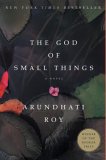Summary | Excerpt | Reading Guide | Reviews | Readalikes | Genres & Themes | Author Bio

Not old.
Not young.
But a viable die-able age.
They were nearly born on a bus, Estha and Rahel. The car in which Baba, their father, was taking Ammu, their mother, to hospital in Shillong to have them, broke down on the winding tea-estate road in Assam. They abandoned the car and flagged down a crowded State Transport bus. With the queer compassion of the very poor for the comparatively well off, or perhaps only because they saw how hugely pregnant Ammu was, seated passengers made room for the couple, and for the rest of the journey Estha and Rahel's father had to hold their mother's stomach (with them in it) to prevent it from wobbling. That was before they were divorced and Ammu came back to live in Kerala.
According to Estha, if they'd been born on the bus, they'd have got free bus rides for the rest of their lives. It wasn't clear where he'd got this information from, or how he knew these things, but for years the twins harbored a faint resentment against their parents for having diddled them out of a lifetime of free bus rides.
They also believed that if they were killed on a zebra crossing, the Government would pay for their funerals. They had the definite impression that that was what zebra crossings were meant for. Free funerals. Of course, there were no zebra crossings to get killed on in Ayemenem, or, for that matter, even in Kottayam, which was the nearest town, but they'd seen some from the car window when they went to Cochin, which was a two-hour drive away.
The Government never paid for Sophie Mol's funeral because she wasn't killed on a zebra crossing. She had hers in Ayemenem in the old church with the new paint. She was Estha and Rahel's cousin, their uncle Chacko's daughter. She was visiting from England. Estha and Rahel were seven years old when she died. Sophie Mol was almost nine. She had a special child-sized coffin.
Satin lined.
Brass handle shined.
She lay in it in her yellow Crimplene bell-bottoms with her hair in a ribbon and her Made-in-England go-go bag that she loved. Her face was pale and as wrinkled as a dhobi's thumb from being in water for too long. The congregation gathered around the coffin, and the yellow church swelled like a throat with the sound of sad singing. The priests with curly beards swung pots of frankincense on chains and never smiled at babies the way they did on usual Sundays.
The long candles on the altar were bent. The short ones weren't.
An old lady masquerading as a distant relative (whom nobody recognized, but who often surfaced next to bodies at funerals--a funeral junkie? A latent necrophiliac?) put cologne on a wad of cotton wool and with a devout and gently challenging air, dabbed it on Sophie Mol's forehead. Sophie Mol smelled of cologne and coffinwood.
Margaret Kochamma, Sophie Mol's English mother, wouldn't let Chacko, Sophie Mol's biological father, put his arm around her to comfort her.
The family stood huddled together. Margaret Kochamma, Chacko, Baby Kochamma, and next to her, her sister-in-law, Mammachi--Estha and Rahel's (and Sophie Mol's) grandmother. Mammachi was almost blind and always wore dark glasses when she went out of the house. Her tears trickled down from behind them and trembled along her jaw like raindrops on the edge of a roof. She looked small and ill in her crisp off-white sari. Chacko was Mammachi's only son. Her own grief grieved her. His devastated her.
Though Ammu, Estha and Rahel were allowed to attend the funeral, they were made to stand separately, not with the rest of the family. Nobody would look at them.
It was hot in the church, and the white edges of the arum lilies crisped and curled. A bee died in a coffin flower. Ammu's hands shook and her hymnbook with it. Her skin was cold. Estha stood close to her, barely awake, his aching eyes glittering like glass, his burning cheek against the bare skin of Ammu's trembling, hymnbook-holding arm.
1997 Arundhati Roy All Rights Reserved.




When an old man dies, a library burns to the ground.
Click Here to find out who said this, as well as discovering other famous literary quotes!
Your guide toexceptional books
BookBrowse seeks out and recommends the best in contemporary fiction and nonfiction—books that not only engage and entertain but also deepen our understanding of ourselves and the world around us.